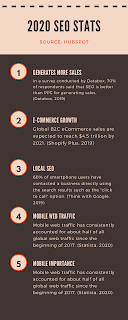3 local SEO strategies for small business that will improve your visibility in local searches
Have you optimized your business for Google local search? If not, you are failing to take advantage of this significant opportunity. This blog will discuss three local SEO strategies that will improve and boost your local search ranking.
In recent years consumers have changed the way that they look for services or business products they need. More consumers are using the Internet and their mobile phones for quick searches on the go, the exact time they are required.
According to HubSpot, 46% of all Google searches are looking for local information. That means you can't ignore local search engine optimization (SEO) if you want to draw customers to your store. If you're a small business or a local business, local SEO is one of the most important strategies to focus on right now. The good news is that you don't need to spend a lot of money to rank well in a local search. You can do it yourself right now.
What is local SEO?
"Local SEO (Search Engine Optimization) is the process of improving search engine visibility for local businesses, primarily those with brick-and-mortar locations. By following local SEO best practices, businesses can improve organic traffic from searches performed by customers in nearby areas." HubSpot
Where to start?
1st. step: claim your Google My Business listing if you haven't done it already, and make sure to complete all your profile with the correct information. When completing your profile on Google My Business, make sure all your business details are consistent with your website and other online directories. Try to get more reviews from your clients and respond to all of them. When filling your profile, pay special attention to services and product categories. The benefit of doing this step alone is that you increase your chances to appear on Google Maps and organic searches in your local area.
2nd step: look to other great places to list your business and get high-quality citations. Citations are instances where there is a mention about your business and the products or services you offer, the address or phone number, or your company website on another website, typically called a business directory or citation. When doing that, make sure your business information is consistent and complete across all online directories.
3rd step: this step can make all the difference to your business and help you position yourself as an authority in your field, and help you stay ahead of the competition. You can do this by producing high-quality content in the form of a blog, commonly referred to as content marketing, since you can target industry keywords and gain even more targeted traffic. Blogs have become increasingly important to drive traffic to companies' websites and add value to their clients. Many businesses run their own blogs and publish articles about their own subject areas and company news. Content by other authors can also be posted. This creates high-quality, relevant content that offers a lot of added value to users, customers, and potential customers. If you also share your blog posts on social networks and in your newsletter, you can generate additional traffic.
#localseotips#seolocal#seotips#localseomarketing#smallbusinesstips#smallbusinessadvice#marketingblog#marketingexpert#marketingsolutions#googlemybusiness#digital#digitalmarketing
Rejane Stratton
Reference:
DREESEN, James. SEO for Google Places - The Secret to Crushing Your Competition with Local SEO and Google Places. James Dreesen. Kindle Edition.
HELLWIG, B. (2018) ‘Local SEO Drives Store Traffic,’ Dance Retailer News, 17(10), p. 6. Available at:
https://search.ebscohost.com/login.aspx?direct=true&AuthType=ip,shib,cookie,url&db=bth&AN=131899559&site=eds-live (Accessed: 8 March 2021).
SMITH, Kelsey. A Comprehensive Guide to Local SEO in 2021. Available at: https://blog.hubspot.com/marketing/local-seo (Accessed: 8 Mar 2021).




Very informative Rejane. Ever since the Covid-19 pandemic, local SEO is something I feel has become even more important. Now that small businesses can't even rely on footfall into their shops from their local area, it's more important than ever that they make people aware of what they're selling. Customers no longer have the luxury of spending a lot of time researching shops in person so making sure they are high up in a search engine results page is crucial. A lot of small businesses are now also using location-based targeting on social media to reach out to customers in their area.
ReplyDeleteIt is amazing to see businesses forget to put their location on their site, or forget how important Google My Business can be. Especially during lockdown, location can make all the difference of gaining a customer that might have gone elsewhere previously.
ReplyDeleteI like the idea of collaborating with other businesses also to boost your online presence. It will certainly benefit from reaching another customer base and adding quality to your own website. Blogs are certainly an excellent way to include relevant keywords, an element many are missing, but the time and effort is certainly worth it for SEO.
The COVID-19 pandemic has forced the closure of many local SME's. In turn, many local businesses have had to refocus their online offerings to generate enough income to stay afloat. Local SEO is now an effective tool for all SME's to build their brand image and local customer base. Quality reviews and citations from local customers can provide a valuable source of brand awareness to potential customers.
ReplyDeleteGoogle My Business pages allow local SME's to build a high degree of trust with their local customer base and build a solid reputation for providing a top-quality service/product. GMB pages are another great way to generate increased traffic and more sales.